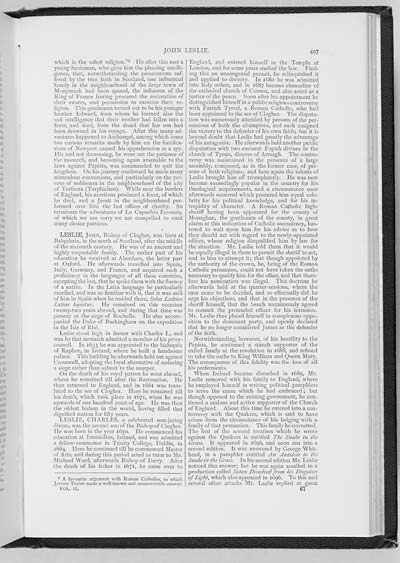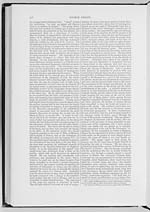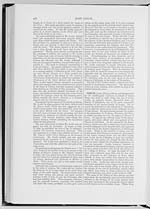497
which is the safest religion."1 He after this met a
young Scotsman, who gave him the pleasing intelli-
gence, that, notwithstanding the persecutions suf-
fered by the true faith in Scotland, one influential
family in the neighbourhood of the large town of
Monymusk had been spared, the influence of the
King of France having procured the restoration of
their estates, and permission to exercise their re-
ligion. This gentleman turned out to be his younger
brother Edward, from whom he learned also the
sad intelligence that their mother had fallen into a
fever, and died, from the dread that her son had
been drowned in his voyage. After this many ad-
ventures happened to Archangel, among which some
too curious remarks made by him on the fortifica-
tions of Newport caused his apprehension as a spy.
His zeal not decreasing, he wore out the patience of
the monarch, and becoming again amenable to the
laws against Papists, was commanded to quit the
kingdom. On his journey southward he made many
miraculous conversions, and particularly on the per-
sons of noblemen in the neighbourhood of the city
of Torfecan (Torphichen). While near the borders
of England, his exertions produced a fever, of which
he died, and a Jesuit in the neighbourhood per-
formed over him the last offices of charity. So
terminate the adventures of Le Capuchin Ecossois,
of which we are sorry we are compelled to omit
many choice portions.
LESLIE, JOHN, Bishop of Clogher, was bora at
Balquhain, in the north of Scotland, after the middle
of the sixteenth century. He was of an ancient and
highly respectable family. The earlier part of his
education he received at Aberdeen, the latter part
at Oxford. He afterwards travelled into Spain,
Italy, Germany, and France, and acquired such a
proficiency in the languages of all these countries,
excepting the last, that he spoke them with the fluency
of a native. In the Latin language he particularly
excelled, and was so familiar with it, that it was said
of him in Spain when he resided there, Solus Lesleius
Latine loquitur. He remained on this occasion
twenty-two years abroad, and during that time was
present at the siege of Rochelle. He also accom-
panied the Duke of Buckingham on the expedition
to the Isle of Rh�.
Leslie stood high in favour with Charles I., and
was by that monarch admitted a member of his privy-
council. In 1633 he was appointed to the bishopric
of Raphoe, in Ireland, where he built a handsome
palace. This building he afterwards held out against
Cromwell, adopting the loyal alternative of enduring
a siege rather than submit to the usurper.
On the death of his royal patron he went abroad,
where he remained till after the Restoration. He
then returned to England, and in 1661 was trans-
lated to the see of Clogher. Here he remained till
his death, which took place in 1671, when he was
upwards of one hundred years of age. He was then
the oldest bishop in the world, having filled that
dignified station for fifty years.
LESLIE, CHARLES, a celebrated non-juring
divine, was. the second son of the Bishop of Clogher.
He was born in the year 1650. He commenced his
education at Inniskillen, Ireland, and was admitted
a fellow-commoner in Trinity College, Dublin, in
1664. Here he continued till he commenced Master
of Arts, and during this period acted as tutor to Mr.
Michael Ward, afterwards Bishop of Deny. After
the death of his father in 1671, he came over to
1 A favourite argument with Roman Catholics, to which
Jeremy Taylor made a well-known and unanswerable answer.
VOL. II.
England, and entered himself in the Temple at
London, and for some years studied the law. Find-
ing this an uncongenial pursuit, he relinquished it
and applied to divinity. In 1680 he was admitted
into holy orders, and in 1687 became chancellor of
the cathedral church of Connor, and also acted as a
justice of the peace. Soon after his appointment he
distinguished himself in a public religious controversy
with Patrick Tyrrel, a Roman Catholic, who had
been appointed to the see of Clogher. The disputa-
tion was numerously attended by persons of the per-
suasions of both the champions, and each assigned
the victory to the defender of his own faith; but it is
beyond doubt that Leslie had greatly the advantage
of his antagonist. He afterwards held another public
disputation with two eminent Popish divines in the
church of Tynan, diocese of Armagh. The contro-
versy was maintained in the presence of a large
assembly, composed, as in the former case, of per-
sons of both religions; and here again the talents of
Leslie brought him off triumphantly. He was now
become exceedingly popular in the country for his
theological acquirements, and a circumstance soon
afterwards occurred which procured him equal cele-
brity for his political knowledge, and for his in-
trepidity of character. A Roman Catholic high-
sheriff having been appointed for the county of
Monaghan, the gentlemen of the county, in great
alarm at this indication of Catholic ascendency, has-
tened to wait upon him for his advice as to how
they should act with regard to the newly-appointed
officer, whose religion disqualified him by law for
the situation. Mr. Leslie told them that it would
be equally illegal in them to permit the sheriff to act,
and in him to attempt it; that though appointed by
the authority of the crown, he, being of the Roman
Catholic persuasion, could not have taken the oaths
necessary to qualify him for the office, and that there-
fore his nomination was illegal. This doctrine he
afterwards held at the quarter-sessions, where the
case came to be decided, and so effectually did he
urge his objections, and that in the presence of the
sheriff himself, that the bench unanimously agreed
to commit the pretended officer for his intrusion.
Mr. Leslie thus placed himself in conspicuous oppo-
sition to the dominant party, and openly declared
that he no longer considered James as the defender
of the faith.
Notwithstanding, however, of his hostility to the
Papists, he continued a stanch supporter of the
exiled family at the revolution in 1688, and refused
to take the oaths to King William and Queen Mary.
The consequence of this fidelity was the loss of all
his preferments.
When Ireland became disturbed in 1689, Mr.
Leslie removed with his family to England, where
he employed himself in writing political pamphlets
to serve the cause which he had embraced; but
though opposed to the existing government, he con-
tinued a zealous and active supporter of the Church
of England. About this time he entered into a con-
troversy with the Quakers, which is said to have
arisen from the circumstance of his lodging with a
family of that persuasion. This family he converted.
The first of the several treatises which he wrote
against the Quakers is entitled The Snake in the
Grass. It appeared in 1696, and soon ran into a
second edition. It was answered by George Whit-
head, in a pamphlet entitled An Antidote to the
Snake in the Grass. In his second edition Mr. Leslie
noticed this answer; but he was again assailed in a
production called Satan Dissolved from his Disguises
of Light, which also appeared in 1696. To this and
several other attacks Mr. Leslie replied at great
67

![]() Universal Viewer |
Universal Viewer | ![]() Mirador |
Large image | Transcription
Mirador |
Large image | Transcription
![]()

